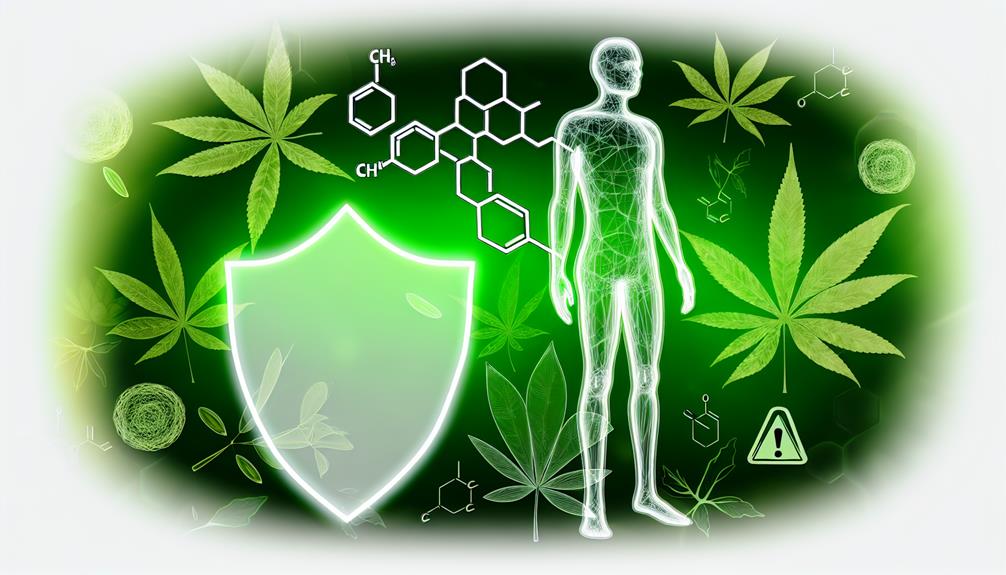Just as you're beginning to explore the potential benefits of a wellness routine, the science of cannabidiol, or CBD, has been evolving at a pace that's hard to ignore. You've likely heard the buzz about CBD's reputed health benefits, but sifting through the information can be as complex as the compound itself. As a non-psychoactive constituent of cannabis, CBD has distinguished itself from its intoxicating counterpart, THC, and has generated significant interest for its possible therapeutic applications. You're right to approach this topic with a blend of curiosity and caution; after all, the market is flooded with an array of CBD-infused products claiming to promote health and well-being. However, as you consider incorporating CBD into your own wellness regimen, it's crucial to understand the scientific evidence behind these claims, the legal landscape that governs its use, and the safety considerations that come into play. As you weigh the potential risks against the purported benefits, you might find that the journey toward understanding CBD is as intriguing as the compound itself.
Key Takeaways
- CBD is a non-psychoactive compound derived from the hemp plant or synthesized in laboratories, and it interacts with the body's endocannabinoid system.
- CBD has potential benefits for anxiety reduction, sleep regulation, and managing cravings.
- Safety considerations include potential side effects, interactions with medications, and the need for continued research and standardization in the CBD industry.
- CBD can be consumed orally, topically, or through inhalation, and its efficacy is influenced by factors such as purity, concentration, body weight, chemistry, and the condition being treated.
Understanding Cannabidiol (CBD)
Cannabidiol (CBD), the second most prevalent active ingredient in cannabis, has garnered significant attention for its potential therapeutic benefits and legal status in most parts of the United States. Derived from the hemp plant or synthesized in laboratories, CBD has become a cornerstone in the burgeoning health and wellness industry. Unlike its psychoactive counterpart, THC, CBD does not cause a high, allowing it to appeal to a broader audience seeking the health benefits of CBD without the intoxicating effects.
Scientific evidence is mounting in favor of the therapeutic effects of CBD. Studies suggest that CBD interacts with the body's endocannabinoid system, which plays a role in regulating functions such as sleep, mood, appetite, and pain sensation. This interaction may explain why CBD is currently under investigation for its potential to reduce anxiety, aid in sleep, manage cravings, and even treat certain medical conditions like childhood epilepsy syndromes.
However, while the health benefits of CBD are promising, it is crucial to acknowledge its potential side effects and interactions with other medications. CBD is primarily marketed and sold as a supplement, not a medication, which means its production is not regulated with the same rigor as pharmaceuticals. This lack of regulation underscores the importance of continued research and standardization in the industry.
The 2018 Farm Bill's legalization of industrial hemp cultivation has opened the door for more extensive research into CBD's medical potential. As studies advance, a deeper understanding of how CBD contributes to health and wellness will emerge, potentially leading to more effective and safer use of this compound.
Legal Status of CBD
You'll find that the legal landscape of CBD is complex, as it's shaped by both federal mandates and state-specific regulations. While the 2018 Farm Bill federally legalized hemp-derived CBD, your state may impose further restrictions or requirements that affect access and usage. It's crucial to navigate the state-by-state variations and comprehend international CBD regulations to ensure compliance and informed usage.
CBD Legal Framework
Understanding the legal landscape of CBD in the United States reveals a complex patchwork of regulations, with its legality largely hinging on whether it's derived from hemp or cannabis.
- The 2018 Farm Bill:
- Legalized hemp plant cultivation
- Differentiated hemp from cannabis by THC content
- Impacted the legal status of products containing CBD derived from hemp
- Food and Drug Administration (FDA):
- Has not approved most CBD products
- Eased regulatory requirements for research in 2015
- Continues to evaluate CBD's safety and efficacy
- State Regulations:
- Vary widely, with all 50 states having distinct legal frameworks
- May impose additional restrictions or requirements
Navigating this terrain requires understanding not just federal mandates but also state-specific laws and ongoing regulatory developments.
State-by-State Variations
While federal legislation such as the 2018 Farm Bill has standardized the legality of hemp-derived CBD, the specific regulations governing its use and sale continue to vary significantly across individual states. The Farm Bill made hemp legal, which impacted the legal status of CBD, yet nuances in state laws create state-by-state variations. Some states align with the FDA, which approves first drug containing CBD for medical use, while others have more restrictive or more permissive approaches. For instance, CBD derived from medical marijuana might be legal in one state but not in another. As you navigate the health care landscape, it's imperative to understand these differences. The legal status and use of CBD products hinge on local legislation, making it essential for you to stay informed about your state's stance.
International CBD Regulations
Globally, the legal status of CBD varies widely, necessitating careful scrutiny before use or transport across international borders. Here's a distilled analysis of international CBD regulations:
- United States:
- Legal under federal law when derived from hemp.
- FDA-approved for certain health conditions, including the brand name Epidiolex.
- European Union:
- Mostly legal, with purified CBD often allowed.
- Regulations can vary by country; some require prescriptions for CBD used in the treatment of pain.
- Asia-Pacific:
- Legal status is highly variable.
- Some countries have strict prohibition, while others are opening up to medical cannabis.
Always consider potential side effects and the distinction between hemp-derived CBD and cannabis. Stay informed as international regulations can shift rapidly.
Therapeutic Claims and Evidence
Dive into the therapeutic claims surrounding CBD, and you'll find evidence-based support for its use in treating certain childhood epilepsy syndromes and reducing anxiety, though other purported benefits warrant more rigorous scientific investigation. The health community recognizes CBD's potential for medical use, particularly its effective role in the treatment of Dravet and Lennox-Gastaut syndromes—two severe forms of epilepsy in children. Here, CBD has demonstrated significant effects in reducing the frequency of seizures, an outcome supported by clinical trials.
Outside of these specific epilepsy syndromes, the benefits of CBD for mental health, particularly in anxiety reduction, have garnered attention. Controlled studies suggest that CBD can alleviate symptoms of anxiety in both animal models and human subjects. However, these findings do not establish CBD as a standalone treatment, and further studies are needed to determine its efficacy across different types of anxiety disorders.
Claims related to chronic pain management and substance abuse cravings are prevalent, yet current evidence does not conclusively support CBD as an effective treatment for these conditions. Although some user reports and preliminary research point towards potential benefits, the lack of large-scale, peer-reviewed studies means that such claims remain unsubstantiated.
Despite the promising aspects of CBD, you should be aware of its side effects, such as nausea and fatigue, as well as potential drug interactions. Moreover, the lack of FDA regulation on the safety and purity of CBD products underscores the necessity for consumer caution.
Safety and Side Effects

As you explore the use of CBD for wellness, it's crucial to consider its safety profile and the potential for adverse effects. Clinical studies have identified side effects such as nausea, fatigue, and irritability, and you should be aware that CBD can also interact with certain medications, including blood thinners. Moreover, high doses of CBD have been linked to liver function disturbances, highlighting the importance of monitoring and moderation.
Potential Health Risks
While CBD is often celebrated for its wellness benefits, it's important to consider that it can also cause side effects such as nausea, fatigue, and irritability. Here's an analytical overview of the potential health risks:
- Adverse effects:
- Nausea, fatigue, irritability
- Increased levels of liver enzymes, indicating possible liver damage
- Interactions with other medications, potentially leading to moderate or severe complications
Evidence suggests that while CBD can be safe and effective at proper doses, exceeding effective doses may result in statistically significant abnormalities in liver function tests. Always seek medical advice before using CBD, especially if you have substance use disorders or use other medications. Remember, unregulated CBD products lack FDA oversight, making self-monitoring for adverse effects crucial.
Common Adverse Reactions
Acknowledging these potential health risks, it's crucial to explore the common adverse reactions associated with CBD, including safety concerns and side effects that users may encounter. CBD, widely recognized for its medical use in conditions like Dravet syndrome and Lennox-Gastaut syndrome—both rare types of epilepsy—as well as chronic pain, also presents certain side effects. Notably, you may experience nausea, fatigue, and irritability. Moreover, CBD can elevate the concentration of certain drugs in your bloodstream, such as blood thinners, leading to heightened risks.
At high doses, CBD has been linked to liver function abnormalities, evident in liver-related blood tests. It's imperative to remember that the FDA does not regulate CBD's safety and purity standards, placing the onus on you to be vigilant about possible adverse reactions and medication interactions.
Methods of CBD Consumption
You can choose from a variety of CBD consumption methods, each tailored to meet specific therapeutic needs and personal preferences. Understanding how CBD helps and how its method of delivery impacts its efficacy is crucial. CBD oil, for example, is an extract commonly used for a broad range of issues and is one of the most accessible forms, often sold online and in stores.
The active ingredient derived from Cannabis sativa can be administered through several avenues:
- Oral Consumption
- *Capsules and Edibles*: Offer delayed onset but prolonged effect.
- *Tinctures and Oils*: Usually placed under the tongue, oils contain CBD that enters the bloodstream quickly.
- *Beverages*: Infused drinks are becoming popular for their ease of use.
- Topical Application
- *Creams and Lotions*: CBD can help with localized pain or skin conditions.
- *Transdermal Patches*: Provide sustained release of CBD into the bloodstream.
- Inhalation
- *Vaping*: Offers rapid absorption but has potential respiratory risks.
- *Smoking*: Fast-acting, yet carries the inherent risks of smoking.
Each method has its own onset time and duration of effect. When you use CBD topically, for instance, it may alleviate localized symptoms without significant systemic absorption. In contrast, inhalation or sublingual administration allows CBD to bypass the digestive system, leading to quicker and more direct absorption.
Prescription drugs, like Sativex for spasticity in multiple sclerosis, utilize CBD's therapeutic potential. As you explore which method to use, consider that the purity and concentration of CBD, your body weight, chemistry, and the condition you're treating will all influence efficacy. Always consult with a healthcare professional before starting any new supplement regimen, especially if you are taking other medications.
CBD's Impact on Wellness

Exploring the various methods of CBD consumption sets the stage for understanding its profound impact on wellness, including potential therapeutic benefits and side effects. Derived from the hemp plant or synthesized in a lab, CBD's medical use is a topic of growing interest and research.
The effectiveness of CBD in pain management is one of the most prominent areas of focus. Clinical studies suggest that CBD may offer an alternative for people who have chronic pain and rely on more dangerous, habit-forming medications like opioids. However, more research is needed to verify the pain-relieving benefits of CBD oil and other products.
Another significant aspect of CBD's impact on wellness is its potential to alleviate anxiety and depression symptoms. Unlike THC, CBD does not cause a high, making it an appealing option for individuals looking for relief from health issues without the mind-altering effects of marijuana or certain pharmaceutical drugs.
Evidence suggests that CBD can help manage childhood epilepsy syndromes, such as Dravet syndrome and Lennox-Gastaut syndrome, which typically don't respond to antiseizure medications. In numerous studies, CBD was able to reduce the number of seizures, and in some cases, it was able to stop them altogether.
However, it's crucial to consider the side effects, such as nausea, fatigue, and irritability. The safety and purity of dietary supplements, including CBD products, are not regulated by the FDA, which means the quality can vary widely.
As you contemplate including CBD in your treatment plan, it's essential to consult with a healthcare provider to ensure it's appropriate for your specific health issues and to determine the most suitable form and dosage. The delivery method of CBD should align with the desired effect and medical condition being addressed.
Research and Clinical Trials
Recent research and clinical trials have provided evidence that CBD may be a viable treatment option for a range of medical conditions. As you explore the current scientific landscape, you'll find that:
- CBD and Multiple Sclerosis (MS)
- Studies suggest CBD could reduce muscle spasticity and pain associated with MS.
- Clinical trials are focusing on CBD's interaction with the endocannabinoid system and its potential to modulate the immune response.
- CBD for Cancer Pain and Severe Forms of Epilepsy
- Research indicates that CBD may alleviate cancer-related pain not fully relieved by traditional painkillers.
- In severe forms of epilepsy, such as Dravet and Lennox-Gastaut syndromes, CBD has reduced seizure frequency, leading to the FDA approval of Epidiolex.
- CBD in Neuropathic Pain and Parkinson's Disease
- Trials show CBD's effectiveness in neuropathic pain, a notoriously difficult-to-treat type of chronic pain.
- Early research suggests potential benefits of CBD on motor and non-motor symptoms of Parkinson's disease, though more in-depth studies are required.
The technical analysis of these trials reveals a complex interaction between CBD and various physiological systems. For instance, in multiple sclerosis, CBD's anti-inflammatory properties may play a key role in symptom relief. In cancer pain management, CBD's ability to act on the endocannabinoid system and reduce inflammation could be crucial for patients who have not found relief through standard pain medication. Similarly, the neuroprotective effects of CBD are of particular interest in conditions like Parkinson's disease, where neuronal damage is a hallmark.
As you consider these findings, it's clear that research and clinical trials are critical in unraveling the medical use of CBD. They provide a scientific basis for understanding how CBD can be integrated into therapeutic protocols for conditions such as multiple sclerosis, severe forms of epilepsy, neuropathic pain, and potentially, Parkinson's disease.
Future of CBD in Health

As the horizon of medical cannabis research broadens, CBD's potential role in future health treatments becomes increasingly significant, guided by scientific discovery and regulatory evolution. Derived from the cannabis plant, CBD stands as the second most prevalent active ingredient and has shown promise in a variety of medical uses. The legal landscape, once a barrier, is evolving, with most of the United States recognizing its potential and the FDA facilitating research since 2015.
You'll find that CBD's impact on conditions like childhood epilepsy syndromes has not only been positive but profound, leading to a significant reduction in seizures. This breakthrough paves the way for further investigation into its efficacy for other neurological disorders, such as Parkinson's disease, where improving quality of life is a critical concern.
Looking at pain management, a domain where CBD has garnered substantial interest, you may appreciate the nuanced approach required to understand its mechanisms. With chronic pain affecting an enormous swath of the population, CBD's non-addictive properties could represent a paradigm shift in how pain is treated, potentially reducing reliance on opioids.
Safety is paramount in the future of CBD in health, with rigorous evaluations needed to mitigate potential side effects and interactions with other medications. As CBD's medical profile expands, you can expect a more refined regulatory framework, especially considering its current lack of FDA regulation as a dietary supplement.
Whether through oils, capsules, patches, or other forms, the versatility of CBD delivery methods aligns with personalized medicine's trajectory. The promise of CBD in enhancing wellness is clear, and as scientific validation grows, so does the anticipation for its integration into mainstream healthcare.
Frequently Asked Questions
What Does CBD Do to You Scientifically?
Scientifically, CBD influences your endocannabinoid system, leading to various effects. It alters receptor binding, potentially modulating pain and reducing anxiety. Molecular interactions of CBD can affect your immune response, aid in sleep regulation, and exhibit neuroprotective properties. While it's not a cure-all, its interaction with your body's systems can contribute to a sense of overall wellness, though you should be aware of possible side effects and medication interactions.
What Positive Effects Does CBD Have on the Body?
You might think CBD is just a fancy salad dressing, but it's actually your body's best friend for pain management and anxiety reduction. It's like a lullaby for sleep improvement and a bouncer for inflammation control. Under stress? CBD's the chill pill. It'll bolster your immune support, polish your skin health, and aid in muscle recovery. Don't just take my word; dive into the evidence, and let's get technical about CBD's benefits.
What Are the Health Cons of Cbd?
You should be aware of the potential risks of CBD, including allergic reactions and drug interactions, particularly with blood thinners. Quality control is often lacking, leading to dosage concerns and purity issues; some products may not contain the advertised amount of CBD, or worse, could have illegal THC. The long-term effects of CBD are not fully understood, which underscores the importance of approaching its use with caution and seeking professional advice.
What Does CBD Do to the Brain and Body?
CBD influences your brain and body by interacting with cannabinoid receptors, which can lead to neurotransmitter modulation and brain homeostasis. It's known for anxiety reduction and may exhibit neuroprotective properties. Some studies suggest it could aid in addiction treatment and cognitive enhancement. Additionally, CBD might alter pain perception, but you'll need to consider the current evidence to fully grasp its role and effects.
